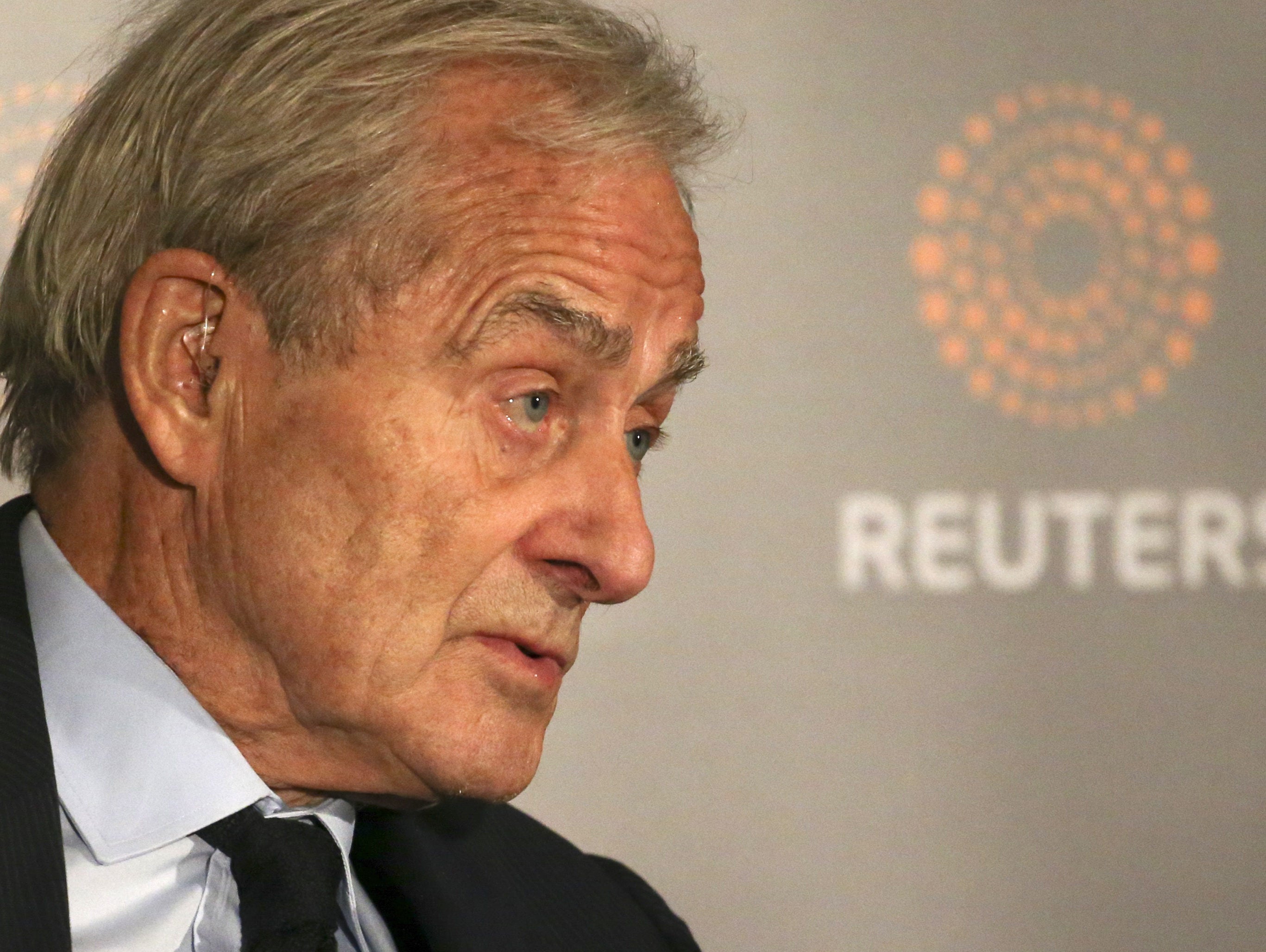
Hundreds of journalists and others touched by the life of Sir Harold Evans gathered at Mansion House in London on Thursday night at a memorial event to celebrate his life – but it was left to a historian to explain why the job he did matters and what we all should do now he has gone.
Sir Harry’s friend Simon Schama said we live in a “scoundrel age” and that we need the great editor back to “set out in black and white the unvarnished truth”.
Imagining what Sir Harry would say if he was there, Schama said: “What is the point of being a one-off, we need more of the right stuff. Multiply me.”
Schama added: “The best thing we can do to honour him is to work at creating an army of Harrys, unwavering in their passion for truth.”
The work of creating that legacy begins with the launch of a salaried Sir Harry Evans Global Fellowship for early career journalists to spend six to nine months pursuing an investigative project in the Reuters newsroom (applications are now open). It is paid for through the Sir Harry Evans Memorial Fund which currently stands at $6m.
The memorial was introduced by Sir Harry’s widow, the journalist and author Tina Brown, who noted that the death of the former Northern Echo, Times and Sunday Times editor in September 2020 at the age of 92 came after lockdown deprived him of his daily swimming routine.
Her voice faltering with emotion at times, she said: “He never lost his conviction that goodness would prevail but only if people of will and courage held careless power to account.”
Former Times editor James Harding said Evans proved “that a good man can be the best journalist of them all”.
The journalist turned best-selling novelist Robert Harris was one of several speakers to read an extract from Sir Harry’s memoir My Paper Chase. His first novel was published by Sir Harry in 1992 in his post Times career as head of Random House.
Actor Jeremy Irons read an extract from Scoop, the classic satirical novel about Fleet Street by Evelyn Waugh.
Writer and journalist Hunter Davies first met Sir Harry in 1958 when they were working on rival daily newspapers in Manchester. He said: “I’m looking forward to meeting him in heaven and I when I get there he will be shouting: ‘Hold the front page’.”
Another writer who owed their career to Sir Harry was novelist Jilly Cooper who was recruited by him to write a column for The Sunday Times in 1969.
She recalled only being censored by him once, when he ruled that her account of watching a male stripper at a hen do was not suitable for a family newspaper.
She drew laughs from the packed hall when she recalled: “I wrote that he rotated his member in the same way an English setter wagged its tale around when covering a bitch.”
She likened Sir Harry to Ulysses in the poem by Lord Tennyson: “To strive, to seek, to find and not to yield.”
Don McCullin, who worked as a photographer under Sir Harry at The Sunday Times, said: “He was the most democratic human being you could meet. Everyone who worked at that newspaper was treated equally and humanely. The door was always open to his office, but he was practically never in that office.”
Editor of Canada’s Globe and Mail David Walmsley was mentored by Evans and shared his five rules for pursuing investigations:
- “Be relentless.
- “Resource the work properly.
- “Remember the newsroom will lose interest at precisely the moment the audience starts to pay attention
- “Maintain a neutral line of enquiry
- “Accept the premise may be wrong.”
Geoff Adams-Spink was born without arms because his mother took the drug Thalidomide when she was pregnant.
Now aged 65 he spoke on behalf of the Thalidomide victims who won £20m in compensation in 1973 as result of a Sunday Times investigation led by Sir Harry.
Yesterday it was announced that Tina Brown would be taking over from Sir Harry as patron of the trust.
Adams-Spink recalled being packed off to a special boarding school at the age of five: “Forgotten and sidelined.”
Adams-Spink said: “We didn’t have the support of politicians, the judiciary or the medical profession. We certainly didn’t have the support the company whose actions and negligence damaged us all…
“One group of people did take us seriously, and did everything they could to put the injustice out there. It was Harry and his team.”
Other speakers at the event included: former Sunday Times magazine editor Magnus Linklater, chairman of the Press Trust of India Aveek Sarker, author Anthony Holden (whose tribute was read by James Harding), Bruce Page (via a recording made a few weeks before his own death), co founder of the Bureau of Investigative Journalism Elaine Potter, chairman of Thomson Reuters David Thomson, Isabel Harriet Evans (speaking on behalf of Sir Harry’s five children and two grand children), Reuters editor in chief Alessandra Galloni and vice-chancellor of Durham University Karen O’Brien.
Picture: Reuters/Bria Webb
Email pged@pressgazette.co.uk to point out mistakes, provide story tips or send in a letter for publication on our "Letters Page" blog
